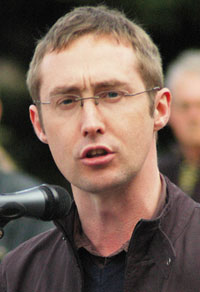22 January 2009 Edition
Another View by Eoin Ó Broin

Nation builders
SPEAKING to An Phoblacht earlier this month, Gerry Adams challenged us all to become “nation builders”. He argued that it was time for “a national conversation on what type of a society, what type of future we want for this island”.
Gerry’s call is timely. As the global and domestic recession takes hold, many of the certainties of the last two decades are being questioned. Our national obsession with narrowly-defined notions of economic development and growth is giving way to questions about what kind of society we have created, whether we could have done it differently, and if we can do better in the future.
The challenge for republicans, particularly in the 26 Counties, is how to make this national conversation relevant to people whose life is now focused on keeping their job, paying their bills and maintaining a decent standard of living.
This is not the first time in our history that we have faced this challenge. Indeed, one of the primary reasons why republicans have failed to achieve our objectives in the past has been our inability to connect these two central elements of our struggle, namely the national and the social.
Every generation of republicans – from Young Ireland to the Fenians, through successive waves of 20th century republicanism – has floundered when articulating the relationship between the national and the social.
Some republicans sought to relegate the social to a secondary stage of struggle, arguing that we were in a national democratic phase and thus not in need of any social detail. Others prioritised the social to the detriment of the national, eventually abandoning the republican ideal itself. Many simply ignored the social altogether, conceding this important ground to the political right.
Even Connolly and his Irish Socialist Republican Party – possibly the only republican political project that consciously sought to combine the national and the social in equal measure – was unable to provoke a national conversation of the kind envisioned by Gerry Adams.
So what is to be done?
The first step is to abandon any approach that seeks to separate the national from the social or prioritise one over the other. It’s time to abandon approaches that seek to relegate the social to some future moment of struggle rather than treat it as an urgent imperative in the present.
The second step is to articulate a project that builds support for a republic that is democratic and socialist in equal measure. We must not seek to follow public opinion, or to appeal to some centrist middle ground. Rather we must engage public opinion, challenge them and convince them that a better Ireland is possible.
The third step is to think and act like nation builders, actively building the nation in everything we do. We must behave as if we are ready for power, prepared to offer real solutions to the many social and economic problems that face the people today.
And in doing so, we must demonstrate that our conception of the nation – united, plural, equal and democratic – is the best possible choice for the future.


